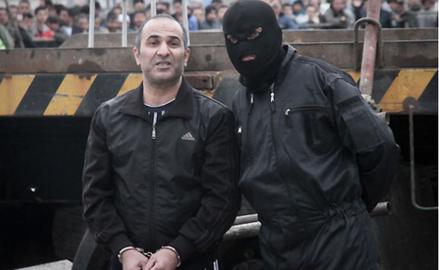The numbers of course are gruesome. By official accounts, Iran has executed 21 of its citizens this January alone, by unofficial accounts, that number reaches 40.
Today authorities brought out a crane in the city of Qazvin and executed another Iranian, this one in public before a crowd of spectators capturing images on their mobile phones. The man, a 44-year-old, married resident of Qazvin convicted for smuggling eight kilograms of heroin, is shown in photos smiling and speaking affably with prison guards as he is being led to the rusty crane.
Identified only as H. Lotfi, he wore a black Adidas track suit and flip-flops to his death, which dangled from his feet after the crane was hoisted. The spectators, a mixed crowd of men and women of varying ages, pressed forward and stood above a truck for a better view. The noose was bright green rope, the day was overcast, and the executioner wore a black ski mask and cheerful blue and red trainers.
Ismail Sadeghi Niyaraki, the prosecuting judge of Qazvin, was on hand at the execution site, and said that 11 others had been sentenced to death that year in the province for drug smuggling. He defended the public nature of the execution in remarks to local media, arguing that public hangings were effective as deterrence to those who might otherwise be drawn to involvement in trafficking.
“People's presence at [such executions] is calming for them, in that reassures them in the determination of the justice system,” he said. “It also shows their support for such measures, which reinforce our battle against smugglers.”
Who are these people, one wonders, who show up for a public hanging? Mercifully there are no children in the audience, but there is a modern-looking young woman with a pushed back veil, and another woman who looks like she could be a sensible professional, her leopard print headscarf so neat and tidy. What can we judge from their faces? Half the men look like they could be out of work, and with youth unemployment at 24 percent, it could be that many had nothing else to do that day. One supposes every society has its prurient cowards, people with a sadistic streak who are willing to go watch a citizen of their town chatting one moment and then hung from a crane the next.
It is easy to recoil, anyone would, from the horrifying, medieval scene of a masked executioner and a crowd of angry villagers. How would the state makes it case for such scenes?
Iran is the victim of Afghanistan's flourishing heroin trade, and in recent years the volume of that drug flowing across the border has increased dramatically. Despite being choked off from the world economy, the Islamic Republic shoulders the work of intercepting massive amounts of heroin and opium, with the highest seizure rates of any country in the world.
To combat this destabilizing trade which has pushed up Iran's own rates of addiction, apart from abetting lawlessness and instability across its eastern border, the Islamic Republic reverts to large-scale executions of smugglers. But does it work? Narcotics trafficking seems to grow each year, as does the volume of heroin being moved across the border. Iranians desperate or greedy enough to make a life as smugglers do not seem dissuaded by the rising number of executions. What remains is the spectacle of the public hanging, the pall of violence cast across a town, a society, some of whose members show up voluntarily to watch.
Photos by local outlet Sobh-e Qazvin and Fars News Agency
visit the accountability section
In this section of Iran Wire, you can contact the officials and launch your campaign for various problems





































comments